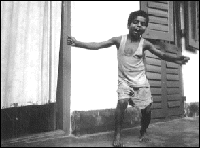|
|
| Director, Script: Arvind Sinha Photography: Asim Bose Editing: Sumit Ghosh Sound: Rabi Acharya Production Company: CHAKRA Source: F FOR FILM 16, Rue de l'ancienne forge, 27120 Fontaine sous Jouy FRANCE Phone: 33-2-32 26 25 39 / Fax:33-2-32 36 86 49 e-mail: seguy@f_for_film.com or: Arvind Sinha 17-A, Anil Roy Road Calcutta-700029 INDIA Phone: 91-33-4666242 / Fax: 91-33-2480724 INDIA / Hindi / 1995 / Color / 16mm / 28 min |
Arvind Sinha (34) is a self-taught filmmaker. He has been making films for the past six years. His first documentary film was on the Chhau Dance of Seraikella, which was widely acclaimed. For his second film, on the great Dhrupad singer Ustad Nasir Aminuddin Dagar, he got the National Award. The Unconquerable is Sinha's third film. He is based in Calcutta and produces his own films. The Unconquerable has also won four major international awards, two each from the prestigious film festivals of Leipzig (Germany) and Bilbao (Spain) and the National Award in India. |
 |
|
| Featuring shy eight-year-old Ajit, a small village boy sent to work in a Calcuttan household, the unobtrusive camera watches him closely as he diligently goes about his daily chores and relishes the meals he is given. Interviews with his father, a poor farmer in the provinces, and Ajit himself, shed light on the hypocrisy hidden in a lopsided social structure. Ajit's innocent eyes, glued to the TV, communicate a multitude without words. | |
|
|
|
|
Director's Statement Ajit is an eight year old domestic in a Calcutta household. He is one of the nine children of Muneswar, a landless farmer in North Bihar. This film articulates in its own way the failure of the Indian system to provide the basics of life to a large majority of the Indian people; basics like food and shelter and primary education. At another level, the film takes up the issue of unrestrained consumerism in one section of the population in the wake of the so-called liberalization and opening up of the economy. The marked growth of vulgarity in the name of entertainment in the media is a fallout of economic liberalization. The film mirrors the influence of all this on impressionable minds, especially those of children. The invasion through the skies with the advent of innumerable foreign television channels and the consequent social and cultural changes taking place in the country have been examined in the film with biting humor. The director does not hide his anger at the lopsided development in the country today. Ajit is a child laborer whose childhood is lost in a maze of adult needs/hypocrisies and insincere Constitutional promises. |
|
